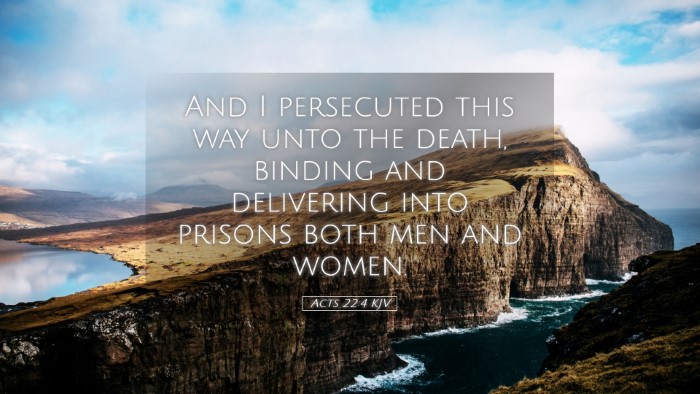Commentary on Acts 22:4
Acts 22:4 states, "And I persecuted this way to the death, binding and delivering into prisons both men and women." This verse is a part of Paul's defense before the audience in Jerusalem. It is essential for understanding his past and the transformation he underwent.
Contextual Background
The setting of Acts 22 is significant. Paul is addressing the Jewish crowd, recounting his testimony. His mention of persecution illustrates his zeal as a Pharisee to uphold the Jewish customs and laws. This moment presents both his previous identity and the radical change that followed his encounter with Christ.
Insights from Commentaries
Matthew Henry's Commentary
Matthew Henry emphasizes the severity of Paul’s actions against the early Christians, indicating that his zeal was misguided but sincere. He notes:
- Persecution Details: Paul openly declares his past sin, acknowledging that his actions stemmed from a fervent belief in Judaism. This acknowledgment is crucial as it provides a foil for the grace he later experienced.
- Spiritual Transformation: Henry points out that Paul's past is a testimony to the transforming power of Christ, suggesting that those who oppose the Gospel can become its greatest proponents.
Albert Barnes' Notes on the Bible
Barnes offers insight into the meaning of "this way," referring to the early Christian movement, which was initially seen as a sect within Judaism:
- Historical Significance: He emphasizes that persecution was not merely a personal vendetta but a broader resistance against what was perceived as a heretical sect threatening Jewish tradition.
- Witness of Change: Barnes highlights the irony in Paul’s narrative; he was once a chief persecutor but became a prominent advocate for the very faith he sought to destroy.
Adam Clarke's Commentary
Clarke provides a vivid depiction of Paul’s character prior to his conversion:
- Passion and Complexity: He stresses that Paul's passions were directed towards his convictions, demonstrating that even those who are fervent in falsehood may possess potent energy that can be redirected for the kingdom of God.
- Personal Confession: Clarke remarks on the importance of recognizing personal sinfulness, reflecting a vital aspect of Christian testimony that resonates with audiences today.
Thematic Implications
This verse encapsulates significant themes pertinent for theology and ministry:
- Redemption: Paul’s life exemplifies the transformative nature of the Gospel, serving as an encouragement to believers that no one is beyond the reach of God’s grace.
- Identity and Legacy: The tension between Paul’s former identity and his new life in Christ raises critical questions about personal legacy and public identity for those involved in ministry.
- Evangelistic Encouragement: Understanding the nature of transformation can embolden pastors and evangelists to share the message of hope freely, emphasizing that every testimony of change carries weight.
Application for Today's Church
In a contemporary setting, this verse prompts significant reflection on the following:
- Understanding Grace: Church leaders must model the grace of God, understanding that personal histories, no matter how steeped in sin, can be redeemed.
- Welcoming Transformation: Communities must provide safe spaces for individuals with tumultuous pasts, offering pathways to redemption and service.
- Vigilance Against Legalism: As Paul once sought to enforce the law, today's church must guard against legalism that can stifle grace and the working of the Holy Spirit.
Conclusion
Acts 22:4 serves as a pivotal reminder of the intertwining dynamics of sin and redemption. Paul's journey from persecutor to apostle highlights the astonishing power of God to reshape lives. For pastors, students, and theologians alike, this verse encourages an appreciation for the transformative nature of the Gospel and inspires a commitment to share this message of hope with others.


